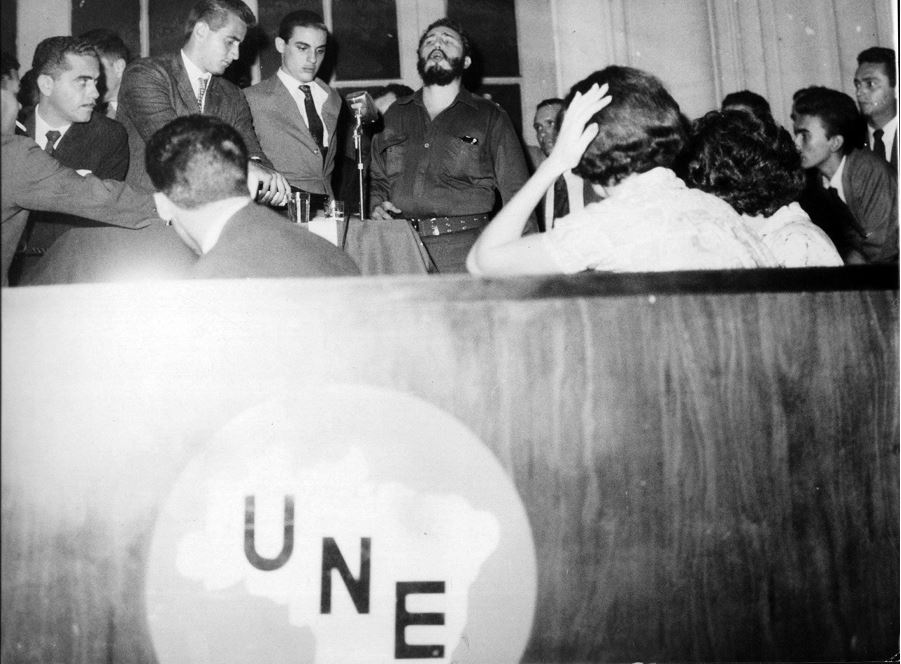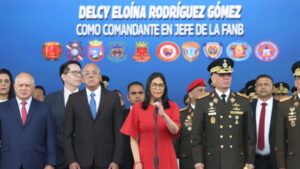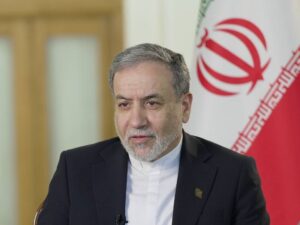
Published 10/05/2024 15:14 | Edited 05/10/2024 15:23
Few people know that the Cuban Revolution was not yet four months old and commander Fidel Castro was landing… in Brazil! Yes, April 29th marked 65 years since the first of 12 trips to Brazil by the Leader of the Cuban Revolution, at that time Prime Minister Fidel Castro Ruz.
Fidel stayed in Brazilian territory for a week and carried out an intense program in São Paulo, Brasília and Rio de Janeiro. At meetings, he defended Latin American unity and integration; he emphasized Brazil’s status as a power and, somewhat prophetically, its possibilities of stimulating the creation of a common market that would enable the continent’s economic development.
In Brasília, in the futuristic cafeteria designed by the genius of Oscar Niemeyer, he had a memorable meeting with President Juscelino Kubitscheck at Palácio da Alvorada. The open and smiling air between the two heads of state that appears in print is a faithful portrait of the cordial relationship that united the two countries.
In Rio, Fidel supported the Pan-American Operation proposed by President JK as a means of raising the standard of living for all Latin Americans and had a lively conversation with Vice President João Goulart.
Having become a personality recognized by a large part of Brazilian public opinion, Fidel agreed to participate in the program “Esta é a sua vida” – the ratings champion of the newly born TV Tupi, presented by the very popular Jota Silvestre. The weekly program, shown in prime time, was a profile of the central character – in this case, Fidel Castro – interspersed with scenes from his life and questions asked impromptu, live. It was exclusively for “This is Your Life” that Fidel made public a text in which the American writer Ernest Hemingway wrote to him: “I have great confidence in Castro’s revolution because it has the support of the Cuban people. I believe in your cause, Cuba has been good to me (…) I lived and worked there.”
On May 7, 1959, before leaving for his return trip, Fidel participated in a public rally organized by the embattled UNE – National Union of Students. An unusual thing also happened there. Weeks earlier, the President of the United States, Dwight Eisenhower, had made an official visit to Brazil. To fill the visitor’s eyes, the US embassy placed posters on hundreds of posts in Rio de Janeiro with the visitor’s photo and the title: “WE LIKE IKE” (“We like Eisenhower”). Upon arriving at the historic UNE campus, in Praia do Flamengo, the Commander-in-Chief came across a gigantic banner painted by students with the giant face of the Cuban leader and the phrase: “WE LIKE FIDEL” (“WE LIKE FIDEL !”).
In just one week, he had given several interviews to the press, in which hundreds of journalists participated, an expression of the interest aroused by the nascent Cuban Revolution and its leader.
Fidel traveled to Brazil on 11 other occasions. He met with presidents José Sarney, Fernando Collor, Itamar Franco, Fernando Henrique Cardoso and Luiz Inácio Lula da Silva. He participated in the Earth Summit/Rio+20 (Rio, 1992) and the Ibero-American Summit (Salvador, 1993). He had numerous exchanges with the media, including an interview with Marília Gabriela (on the “Cara a Cara” program on TV Bandeirantes) and his participation on the “Roda Viva” program on TV Cultura in São Paulo. On several occasions, he spoke with Roberto Marinho, president of Organizações Globo.
He met with prominent political leaders from different political tendencies, including deputy Ulysses Guimarães, president of MDB – Brazilian Democratic Movement, Leonel Brizola, president of the Democratic Labor Party, João Amazonas, president of PC do B, Roberto Amaral, president of PSB. On all his visits to Brazil, he met with Luiz Inácio Lula da Silva, president of the Workers’ Party. He met with the governors of all the states he visited: the governor of Pernambuco, Miguel Arraes; from São Paulo, Orestes Quércia; from Rio de Janeiro, Wellington Moreira Franco and Anthony Garotinho; from Bahia, Antonio Carlos Magalhães; and from Minas Gerais, Eduardo Azeredo.
In 1990, he met with around 100 leaders from nine left-wing parties and movements and two trade unions at the Anhembi Convention Center. On the occasion, he greeted Adão Pretto, then State Deputy and member of the MST National Board. In 1992, during a meeting with Governor Leonel Brizola, a cooperation and technology transfer agreement was signed that allowed treatment to be offered to 6,500 Brazilian children affected by the radioactive contamination of Césium 137. That same year, he met with Terezinha Nunes, victim of the radioactive accident in Goiânia.
In 1990, he exchanged experiences with Luiza Erundina, mayor of São Paulo, and Eduardo Suplicy, president of the city’s Chamber of Councillors. In 1993, during a meeting with the mayor of Salvador, Lídice da Mata, he promised help for children without schools and exchanged views on the contributions that Salvador could make to Cuba in the field of biotechnology.
A clear expression of his interest and respect for religion is the visit he made to the headquarters of the CNBB – National Conference of Bishops of Brazil – in 1990, when he met with more than 1,300 religious and militants from the CEBs – Basic Ecclesiastical Communities – from several Brazilian states. The meeting was chaired, among others, by the Franciscan priest Leonardo Boff, one of the most important theologians in Latin America, and by Frei Betto, promoter of Christian communities with whom the leader of the Cuban Revolution met on repeated occasions.
The revolutionary leader demonstrated his interest in promoting a deep relationship with the intelligentsia and exponents of the most varied artistic expressions and manifestations. Proof of this is the meeting he had at the Memorial da América Latina with the architect Oscar Niemeyer, the anthropologist Darcy Ribeiro and the writer Fernando Morais, responsible for the Memorial’s design, as well as his participation in the decoration ceremony of the anthropologist and indigenist Orlando Villas Boas.
On the 1990 trip, there was an important meeting with intellectuals, in which, in addition to the Commander, Cubans Abel Prieto and Roberto Fernández Retamar participated, while Antonio Callado, Chico Buarque de Holanda and Fernando Morais, among others, represented Brazil. On the occasion, writer Callado read a message of support from intellectuals for Fidel, signed by 300 Brazilian creators, artists and scientists. During the meeting, Fidel said: “If the Revolution were defeated in Cuba, our country’s independence would disappear. Revolution, independence and sovereignty are inseparable in Cuba.”
The Commander also favored, at his meeting, the establishment of a solid and stable link with the science, innovation and technology sector. On a visit to the Osvaldo Cruz Foundation – known as Fiocruz or Manguinhos –, he defended the need for collaboration, integration and the carrying out of common efforts and projects for the development of our countries.
His work in Brazil did not leave aside the promotion of economic and commercial relations. His meetings with businesspeople, organized by the Brazil-Cuba Chamber of Commerce at the Anhembi Convention Center, and his meeting with Albano Franco, president of the National Confederation of Industries of Brazil, are well remembered.
Premonitory was his speech at the Earth Summit in 1992 when, anticipating the challenges we face today as a result of climate change, he said: “An important biological species is at risk of disappearing […]: The man. I ask developed countries to change their consumerist behavior, the main historical cause of environmental degradation. The solution cannot be to prevent the development of those who need it most […] No more transferring lifestyles and consumption habits that ruin the environment to the Third World […] That a fair international order applies […] That all necessary science be used for development without contamination […] May hunger disappear, not man.”
During the First European Union-Latin America Summit, held in Rio de Janeiro in 1999, Fidel told the heads of state present: “We will defend sovereignty as something sacred while there are some very powerful and others very weak; as long as everyone is not willing to renounce it in the name of a more universal sovereignty […] It is urgent to demolish the established financial system to its foundations and create a truly honest, democratic, equitable and humane one that helps eradicate poverty and save the world […] We are ready to receive cooperation from Europe without conditions and solidarity with freedom.”
On that occasion, Jornal do Brasil published that “Latin Americans and some Europeans reached a consensus: the global financial system needs reforms and control mechanisms”. Jornal de Comércio declared: “The current economic system has aged and needs to be urgently reformed.”
Also in 1999, on an emotional day at the Museum of Contemporary Art in Niterói, he received the Araribóia medal from architect Oscar Niemeyer in memory of the leader of a native people who opposed foreign occupation. In 2003, he returned to Brasília for what would be his last visit to the country, to attend the first inauguration of President Luis Inácio Lula da Silva.
During his visits to Brazil, he worked tirelessly in favor of rapprochement between Latin American countries, tirelessly defended justice and contributed decisively to the development and strengthening of ties between Brazil and Cuba in a wide range of fields.
After six decades, the seeds planted by Fidel on twelve historic trips to Brazil are already bearing flowers and fruits.
Article originally published in Brasil de Fato
Source: vermelho.org.br

